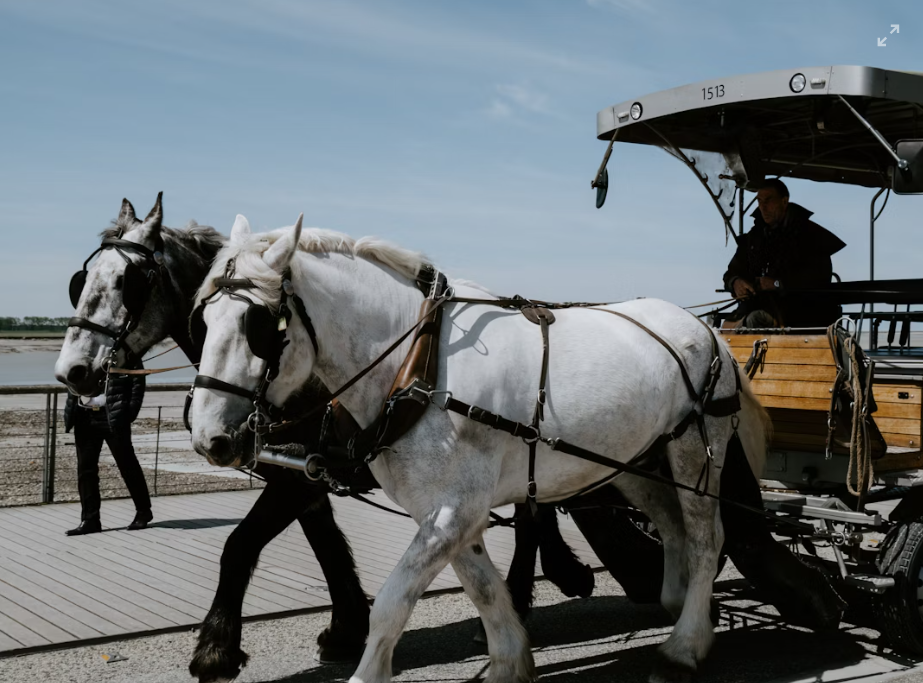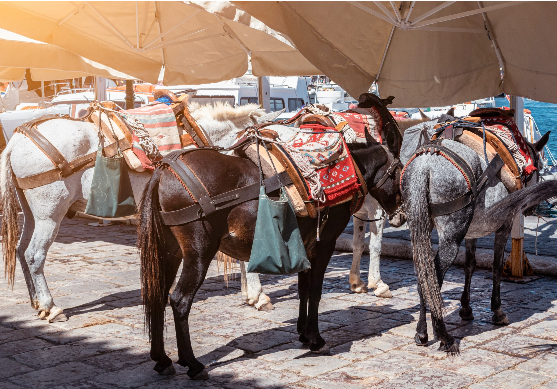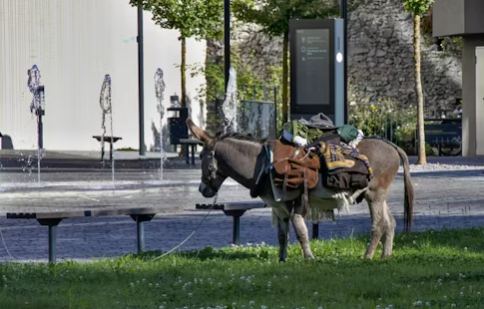The welfare of working equids is one of five priority topics of WOAH Platform on animal welfare for Europe. The ensuring welfare of these animals remains an important challenge and WOAH Platform on animal welfare for Europe continues with activities to support WOAH member in the implementation on Chapter 7.12 on the welfare of working equids of the Terrestrial Animal Health Code promoting a collaborative and coordinated approach for addressing animal welfare challenges. WOAH in collaboration with International Coalition for Working Equids hosted an online event on 29 April 2025, bringing together more than 130 participants from 35 countries—including representatives from international institutions, local partner organisations, and regional veterinary services.
Through expert technical presentations, shared experiences, and practical tools the teleconference aimed to raise awareness on the welfare of working equids, promote the implementation of WOAH international standards, strengthen multisectoral partnerships, share existing tools and knowledge resources, present funding opportunities with World Horse Welfare (WHW), exchange experience on project implementation, and engage local partner organisations.
Introduction to WOAH standards and animal welfare strategy
WOAH’s global strategy on animal welfare is grounded in four pillars: developing animal welfare standards, education and capacity building, implementing these standards and policies, and effectively communicating with governments and the public. WOAH also develops and implements regional animal welfare strategies and platforms to address specific regional needs and priorities.
Chapter 7.12 of the Terrestrial Animal Health Code, adopted in 2016, outlines specific provisions for the welfare of working equids, including responsibilities for actors such as veterinary authorities, owners, NGOs, and local governments.
The presentation focused on assessing animal welfare through animal-based indicators—such as behaviour, body condition, lameness, and response to handling—rather than relying solely on inputs like shelter or feeding. Additionally, end-of-life care, fitness for work, and caretaker training were highlighted as crucial elements of equine welfare policies.
International Coalition for Working Equids
The International Coalition for Working Equids (ICWE), a partnership between four NGOs: World Horse Welfare, The Donkey Sanctuary, Brooke, and SPANA established to work with the World Organisation for Animal Health and its members to support implementation of Terrestrial Code Chapter 7.12 on the Welfare of Working Equids. The ICWE’s continuous engagement with WOAH Platform activities provide valuable support for implementation of WOAH standards on welfare of working equids in the region.
Through active engagement in the development and promotion of WOAH’s international standards, ICFAW contributes expertise across species and regions to support the welfare of farm animals, companion animals, working animals, wildlife, and animals used in research and entertainment. The collaboration, formalized through a Memorandum of Understanding renewed in 2022, includes joint efforts in standard-setting, regional strategies, training, and advocacy to strengthen veterinary services and promote the global adoption and implementation of animal welfare standards.
WESLI: A practical and valuable support implementation tool
One of the main tools highlighted was the Working Equid Standards Library of Information (WESLI), developed by the International Coalition for Working Equids provides practical resources aligned with each topic of Chapter 7.2, including water access, nutrition, shelter, disease prevention, workload, behaviour, and appropiate end-of-life care. The library offers supplementary information for the articles, listing resources with direct links to relevant websites for easy access.
Designed to support governments in implementing and regulating the guidelines of Chapter 7.2, WESLI places particular emphasis on how to measure compliance with welfare standards. It offers two levels of access: a user-friendly summary page per topic and a more detailed resource library with visual guides, field manuals, and case studies. The platform is open-access and intended to be practical for veterinarians, local authorities, NGOs, and policymakers alike.
Scientific contributions from EURCAW
The EU Reference Centre for Animal Welfare for Ruminants and Equines (EURCAW), presented their relevant activities and projects. Their work includes scientific reviews on the effects of confinement and social restriction, environmental enrichment, and a comprehensive review of working equid welfare. Key needs for ensuring animal welfare identified include appropriate shelter, adequate access to food and clean water, proper workload management, minimum working age (three years), correct harness use, daily health monitoring, rest periods, and positive human-equine interactions.
EUROCAW develops fact sheets and training toolkits to support national authorities in inspections. They are currently creating materials on assessing social bonds in equids, stunning at slaughter, and managing painful procedures to improve welfare practices across the sector.
Case study: Local implementation in Romania
The Asociatia pentru Bunastarea Cailor (ABC), and Romanian NGO presented a multi-year initiative that combined baseline welfare assessments with in-depth interviews with horse owners. The assessments were conducted using a dedicated protocol aligned with WOAH standards and supported by a data platform capable of statistical analysis. This approach highlights how local partnerships, long-term community engagement, and evidence-based tools can foster both trust and systemic change.
Eva Lazar, a veterinarian at ABC emphasized the importance of gradual progress, stating that ‘each small step matters’ in the long-term process of improving equid welfare, while she reflected on the enduring presence of horses in daily life.
Funding and Partnerships
During the event, the WHW shared information on their funding mechanisms that support equid welfare projects. Their grant scheme aims to support communities that depend on working equids, offering up to £ 5,000 to legally registered organizations — including NGOs, educational institutions, and government departments — that have a governance structure, nd financial accountability mechanisms in place.
Eligible projects may include baseline studies or targeted interventions addressing specific welfare issues such as harnessing or lameness.
The webinar emphasized the critical role of Public-Private Partnerships (PPPs) as a key mechanism promoted by WOAH to strengthen veterinary services and improve animal welfare, including working equids. The understanding that the “private sector” goes beyond private companies to include NGOs, academic institutions, producers traders, and civil society organizations., . PPPs are collaborative efforts in which the public and private sectors share responsibilities, risks, and resources to achieve common and sustainable goals. This inclusive approach allows for the implementation of WOAH standards and enhances the provision of veterinary services, surveillance, education, and emergency response. By harnessing the strengths of diverse stakeholders, PPPs offer innovative, context-specific solutions and long-term impact.
Regional Platform on animal welfare for Europe – activities on welfare of working equids
The welfare of working equids has been identified a priority topic for WOAH Regional Platform on Animal Welfare for Europe since 2016. The Platform, in collaboration the ICWE organized series of activities to support of the implementation of WOAH standards on welfare of working equids. Those activities include an Awareness Day in Uzbekistan (2017) base line survey (2019), online regional meeting (2023) and dedicated workshop in Madrid (2024).
These initiatives have highlighted the importance and relevance of WOAH’s standards, helped to identify the needs of member countries, and provided an opportunity to share practical tools and experiences, engage local partners and promote project development.
The Platform is continuing its efforts by to support WOAH members in implementation of WOAH standards on welfare of working through strengthening collaboration, providing technical support, and developing new initiatives to further improve the welfare of working equids across member countries.
Conclusions
The regional webinar successfully advanced awareness of the WOAH international standards, notably Chapter 7.12 of the Terrestrial Animal Health Code, by integrating scientific expertise, practical tools like the WESLI library, and the lived experiences of field actors.
Participants engaged with the challenges and responsibilities related to equid welfare, exploring animal-based indicators, the socioeconomic role of equids, and the practical application of standards in varied contexts, Furthermore, the event presented tangible opportunities for action through the WHW grants program, encouraging legally registered organizations to contribute to equid welfare on the ground and help identify need for WOAH future regional activities to support members in implementation WOAH standards on welfare of working equids
By bringing together over 130 stakeholders from 35 countries, the webinar created momentum for coordinated action, resource sharing, and long-term partnerships that place working equids at the heart of both policy and practice.
Resources and Links


